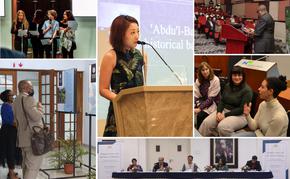[This article, the first portion of a statement called Shared Vision, Shared Volition: Choosing Our Global Future Together, comes from the Baha’i International Community, and is addressed to the United Nations Climate Change Conference in Paris, France. Quotes from the Baha’i teachings have been added.]
The earth is but one country, and mankind are its citizens. – Baha’u’llah
Anthropogenic climate change is not inevitable; humanity chooses its relationships with the natural world. This lies at the heart of the 2015 Paris Climate Conference (COP 21), the efforts of which are, in many ways, focused on identifying means by which better choices can be made. The current global order has often approached the natural world as a reservoir of material resources to be exploited. The grave consequences of this paradigm have become all too apparent, and more balanced relationships among the peoples of the world and the planet are clearly needed. The question today is how new patterns of action and interaction can best be established, both individually and collectively, through personal choices, social systems, and governing institutions.
With the adoption of the United Nations’ 2030 Agenda for Sustainable Development, including its social, economic and environmental dimensions, momentum for meaningful change has been building. A universal, legally binding agreement on carbon emissions seems within reach for the first time. Yet sustainability is defined as much by human and social factors as ecological ones. Correlation has been found, for example, between inequality and environmental degradation, suggesting that the relationships linking human beings with one another have a direct impact on the physical resources of the planet. The global systems that have left many facing poverty and want, have similarly impoverished the natural environment.
A more balanced attitude toward the environment must therefore address human conditions as consciously as it does natural ones. It must be embodied in social norms and patterns of action characterized by justice and equity. On this foundation can be built an evolving vision of our common future together. And that vision, in turn, stands as a powerful mechanism for mobilizing action around the world and coordinating numerous efforts into mutually-reinforcing lines of action.
Foundations for a New Consciousness
Setting humanity on a more sustainable path to the future involves transformation in attitudes and actions. Reform of institutional structures will be critical, and indeed this is a central focus of those gathered at COP 21. Yet ultimately it is people, whatever their role or place in society, who implement the policies of a central administration or ignore them, who participate in well-conceived programs or continue patterns of life as before. We all have agency and none of our decisions are without consequence. Establishing sustainable patterns of individual and collective life will therefore require not only new technologies, but also a new consciousness in human beings, including a new conception of ourselves and our place in the world.

From where will this consciousness arise? And where will the volition and self-discipline needed to embody it in countless cities, towns, and villages be found? Qualities such as the capacity to sacrifice for the well-being of the whole, to trust and be trustworthy, to find contentment, to give freely and generously to others derive not from mere pragmatism or political expediency. Rather they arise from the deepest sources of human inspiration and motivation. In this, faith has shown itself to be key, whether in the efficacy of sustainability efforts or the capacity of the human race.
Of particular note is the role to be played by religious faith. Religion has been a feature of human civilization since the dawn of recorded history, and has prompted countless multitudes to arise and exert themselves for the well-being of others. Religion offers an understanding of human existence and development that lifts the eye from the rocky path to the distant horizon. And when true to the spirit of its transcendent founders, religion has been one of the most powerful forces for the creation of new and beneficial patterns of individual and collective life.
Religion therefore offers a vital source of commitment to new and potentially challenging patterns of daily life. It is notable that religious leaders and faith-based organizations have been increasingly active on environmental and justice issues as they relate to climate change. But religious conviction does not automatically translate into service to the common good. It is entirely possible, for example, to have a congregation of well-intentioned adherents whose actions do little to contribute to the betterment of society. Clearly there is much to learn about how noble ideals become expressed in committed, sustained action. In this sense, religious communities can be understood as communities of practice in which spiritual teachings are translated into social reality. Within them, a process of capacity building that enables people of all backgrounds to participate in the transformation of society can be set in motion. How this unfolds in different contexts and cultures promises to be an area of rich exploration for all working on sustainability issues.
Identifying the spiritual principles at the root of ecological challenges can also be key in formulating effective action. Principles– that humanity constitutes but a single people, for example, or that justice demands universal participation in the work of sustainable development – reflect the rich complexity of human nature. Just as importantly, they help foster the will and the aspiration needed to facilitate the implementation of pragmatic measures. Identifying the principles underlying given issues and formulating action in light of their imperatives is therefore a methodology that all can benefit from and contribute to – those in traditionally religious roles, but also leaders of government, the corporate sector, civil society, and others involved in the formulation of public policy.

















Comments
Sign in or create an account
Continue with Facebookor